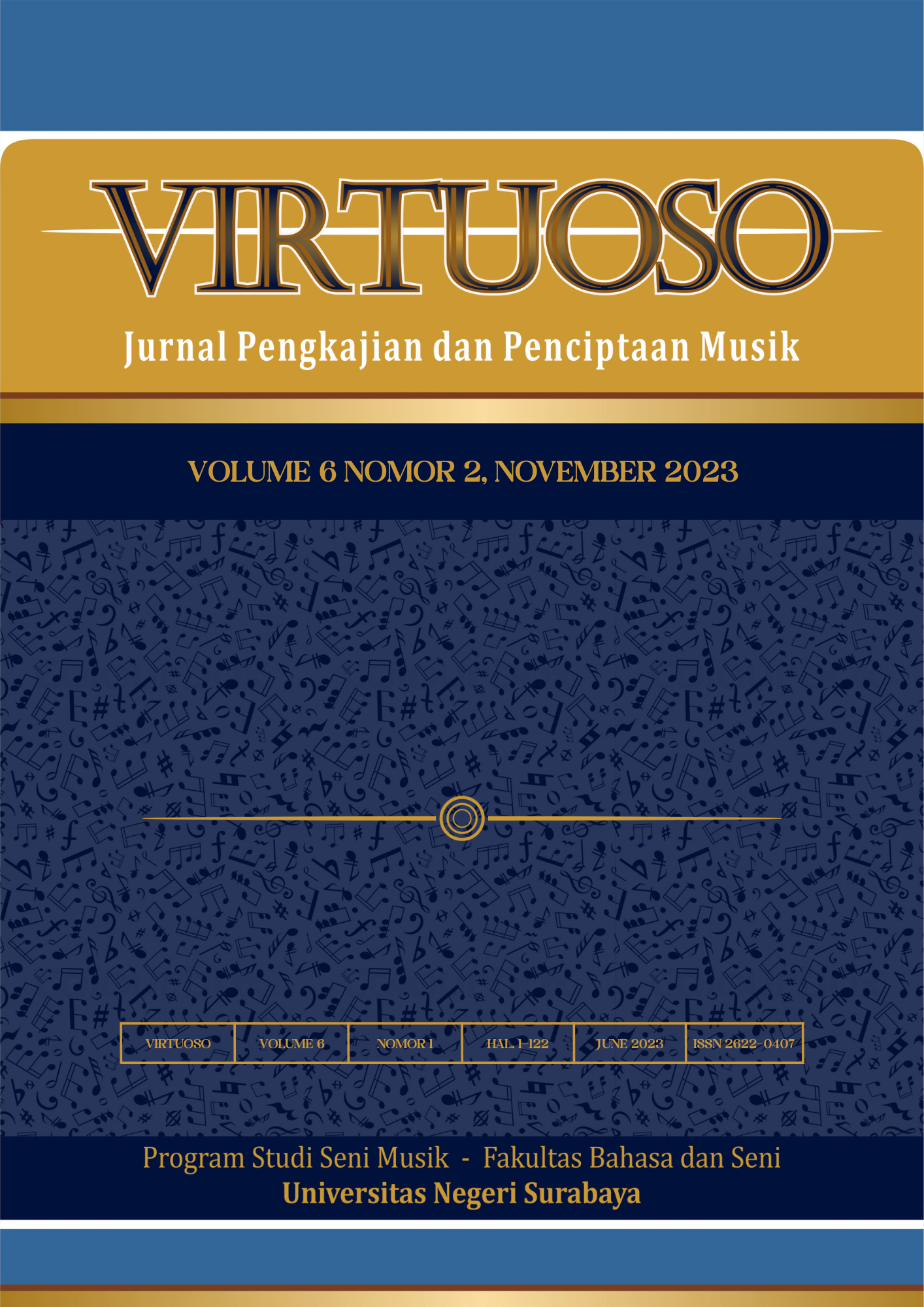Management of Learning Environment in Studio Class at Seraphim Music Studio
Main Article Content
Abstract
Seraphim Music Studio is a professional non-formal music school specializing in arts education, particularly music education. Undoubtedly, Seraphim Music Studio boasts internationally certified and professional instructors in their respective fields. The cornerstone of effective learning lies in adequate classroom spaces. The management of a conducive learning environment significantly influences the learning process in the classroom. As one of the non-formal music schools in Surabaya, Seraphim Music Studio has designed all its classrooms as studio spaces. Several challenges arise in the development of these studio classrooms, including spatial limitations, diversity in musical instruments, and studio class management. This research employs a qualitative research method, focusing on data collection through interviews, observations, and document analysis to understand complex and contextual phenomena. The findings of this article reveal that Seraphim Music Studio identifies 7 standards for studio classroom facilities and service management that must be met. These standards include service speed, information accuracy, and courtesy in communication. Keywords for this abstract include Seraphim Music Studio, non-formal music education, internationally certified instructors, studio classrooms, learning environment management, and service standards.
Downloads
Article Details

This work is licensed under a Creative Commons Attribution-NonCommercial-ShareAlike 4.0 International License.
The copyright of the received article once accepted for publication shall be assigned to the journal as the publisher of the journal. The intended copyright includes the right to publish the article in various forms (including reprints). The journal maintains the publishing rights to the published articles.
References
Alamsyah, M., Ahmad, S., & Harris, H. (2020). The Influence of Academic Qualifications and Teaching Experience on Teacher Professionalism. In Journal of Educational Research (Vol. 1, Issue 3).
Anggito, A., & Setiawan, J. (2018). Qualitative Research Methodology (Ella Deffi Lestari, Ed.). CV. Footsteps.
Aslamiah, Pratiwi, DA, & Riandy Agusta, A. (2022). Classroom Management (A. Suriansyah, Ed.; 1st ed., Vol. 1). Rajawali Press.
Barus, CS, & Silalahi, D. (nd). The Influence Of Social Media Promotion And Service Quality On Consumer Purchasing Decisions At Sosmed Cafe Abdullah Lubis Medan.
D, KCF, & Binggeli, C. (2018). INTERIOR DESIGN ILLUSTRATED (4Th ed.). John Willey & Sons, Inc. Hoboken, New Jersey.
Elita Tarihoran, J., Ika Mardiani, M., Dwi Putri, N., Sari Novareila, R., Sofia, A., & Farida Adi Prawira, I. (2021). The Importance Of Social Media As A Start-Up Marketing Strategy In Indonesia (Vol. 9, Issue 1). http://openjournal.unpam.ac.id/index.php/kreatif
Faruqi, D. (nd). Efforts to improve students' learning abilities.
Gustria, N. (2020). The Relationship Between Learning Environment Management And Learning Outcomes Of Tahfizd Participants At Tpq-Tpsq Al-Hasib Beringin Nagari Lansat Kadap Rao Selatan District, Pasaman District. SPECTRUM: Journal of Out-of-School Education (PLS), 8(3), 262. https://doi.org/10.24036/spektrumpls.v8i3.109374
Hasanah, U., & Nulhakim, L. (2015). Development Of Animated Film Learning Media As A Media For Learning The Concept Of Photosynthesis. Journal of Science Research and Learning, 1(1), 91. https://doi.org/10.30870/jppi.v1i1.283
Hidayatullah, R. (2020). Creativity In Music Education: Divergent And Convergent Thinking Creativity In Music Education: Divergent And Convergent Thinking. 2. https://doi.org/10.7592/musikolastika.v2i1.32
Khatimah, H., Pasca, M., Sunan, U., & Djati, G. (nd). Position And Role Of The Media In Public Life (Vol. 16, Issue 1).
Moleong, L. J. (2006). Qualitative Research Methodology. PT Teen Rosdakarya, Bandung.
Nainggolan, OTP, Ismudiati, E., & Manek, BA (2021). The concept of the Sariswara method is seen in music education in efforts to develop a music education curriculum based on Indonesian national culture. Gondang: Journal of Arts and Culture, 5(2), 150. https://doi.org/10.24114/gondang.v5i2.28290
State, S., & South, S. (nd). The Urgency Of A Conducive Learning Environment In Encouraging Students To Active Learning Arianti.
Nur Jaya, H. (2017). Taklimuna Journal Vol.02 No.01-Juwari. Journal of Education and Science, 17(1).
Education, E., Based, M., Culture, I., Tengah, D., Winangsit, E., Sub'haan, F., & Sinaga, S. (2020). The Essence of Cultural Industry-Based Music Education amid the Covid-19 Pandemic. In Proceedings of the UNNES National Postgraduate Seminar.
Rahardjo, M. (2010). Triangulation in Qualitative Research.
Sa'idah, RN, & Chanda, F. (nd). EDUCREATIVE: Journal of Children's Creativity Education Extracurricular Management In Developing Children's Interests And Talents. http://educreative.id/index.php/index
Private, R., Prodi, S., Arts, P., Faculty of Languages, R., University, S., & Yogyakarta, N. (nd). Interior Design Of Blackbox Music Studio Kulonprogo Interior Design Of Blackbox Music Studio Kulonprogo.
Warsono SMP Negeri, S., & North Bengkulu, K. (nd). Class Management In Improving Student Learning.
Zamil, I., Pd, S., & Pd, M. (2016). The Influence Of Music And The Learning Environment On Students. In October (Vol. 11, Issue 2).

